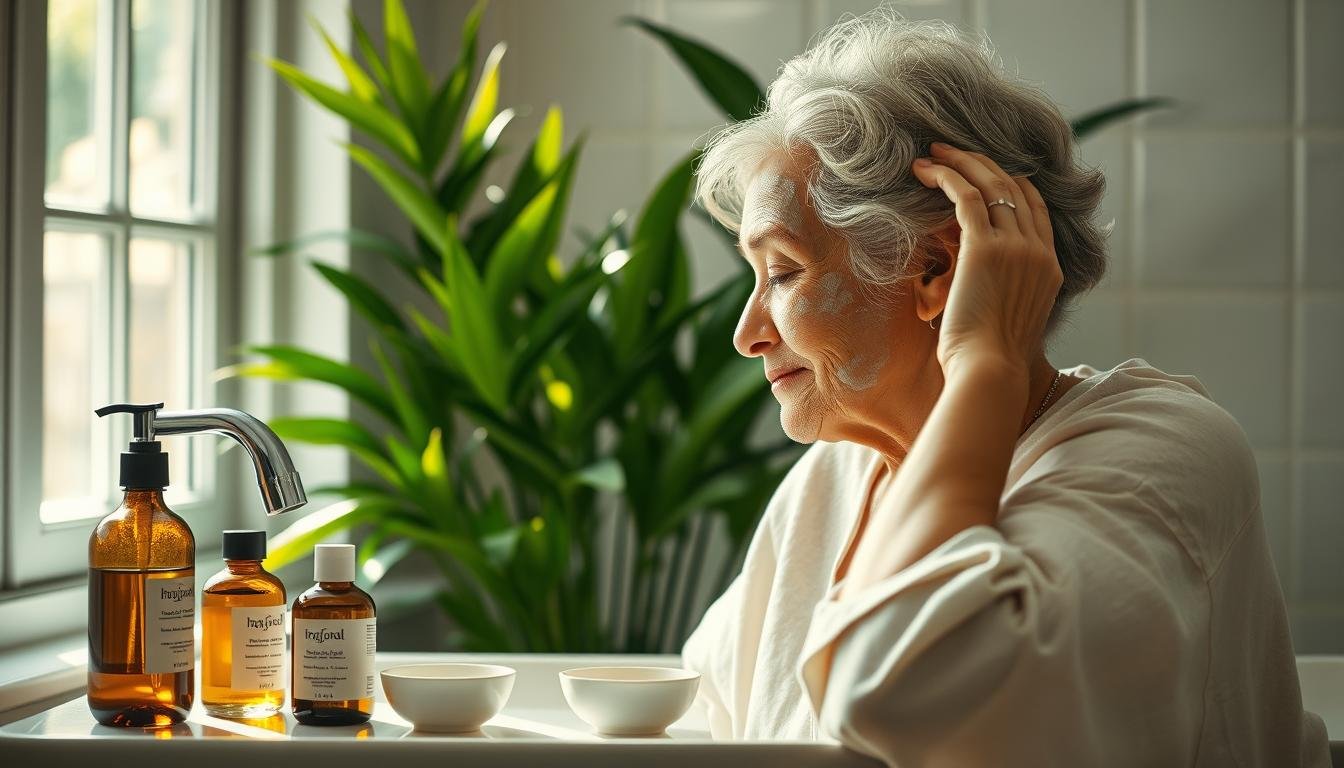Best Hair Care Routine for Seniors – Expert Guide
As we age, our hair undergoes a remarkable transformation. According to hairstylist Kasey Bertucci, seniors may need to drink a little over 11 cups of water daily for healthy hair. This surprising statistic highlights the unique needs of elderly hair, which often experiences increased shedding, slower growth, more frizz and dryness, less volume, and loss of pigmentation. Hormonal changes during menopause can further impact sebum production, leading to increased dryness and brittleness. The scalp also undergoes similar changes as facial skin, requiring a holistic approach to hair care.
Addressing the unique needs of aging hair requires a tailored routine that focuses on scalp care, strand protection, and proper nutrition. By Understanding the Common concerns and implementing the right strategies, seniors can maintain healthy, vibrant hair well into their golden years.
Key Takeaways
- Elderly hair often experiences increased shedding, slower growth, more frizz and dryness, less volume, and loss of pigmentation.
- Hormonal changes during menopause impact sebum production, leading to increased dryness and brittleness.
- The scalp undergoes similar changes as facial skin, requiring a holistic approach to hair care.
- Proper hydration, with over 11 cups of water per day, is crucial for maintaining healthy hair in seniors.
- A tailored hair care routine focusing on scalp care, strand protection, and proper nutrition can help seniors maintain vibrant, healthy hair.
Understanding Senior Hair Needs
As we age, our hair undergoes a range of changes that require specialized care and attention. From age-related hair changes to Common senior hair concerns, understanding these unique needs is crucial for maintaining healthy, vibrant locks in our golden years.
Why Hair Changes with Age
Hair follicles become smaller, and sebum production declines with age, leading to a drier and more brittle texture. Pigment cells also decrease, causing the familiar gray or white hair. Hormonal changes can contribute to increased shedding and slower regrowth, while hair texture may become coarser and stiffer over time. Additionally, scalp health often deteriorates, further impacting overall hair quality.
Common Senior Hair Concerns
- Thinning hair: As we age, the rate of hair growth slows, and the hair strands become finer, leading to a noticeable reduction in volume and density.
- Dryness and brittleness: The hair’s inherent moisture decreases, making it prone to breakage and split ends.
- Loss of shine and luster: The scalp’s sebum production declines, leaving the hair looking dull and lifeless.
- Increased sensitivity: Seniors’ hair and scalp become more sensitive to harsh chemicals and environmental factors.
By understanding these age-related hair changes and addressing common senior hair concerns, we can develop a tailored hair care routine that helps seniors maintain healthy, vibrant locks well into their golden years.
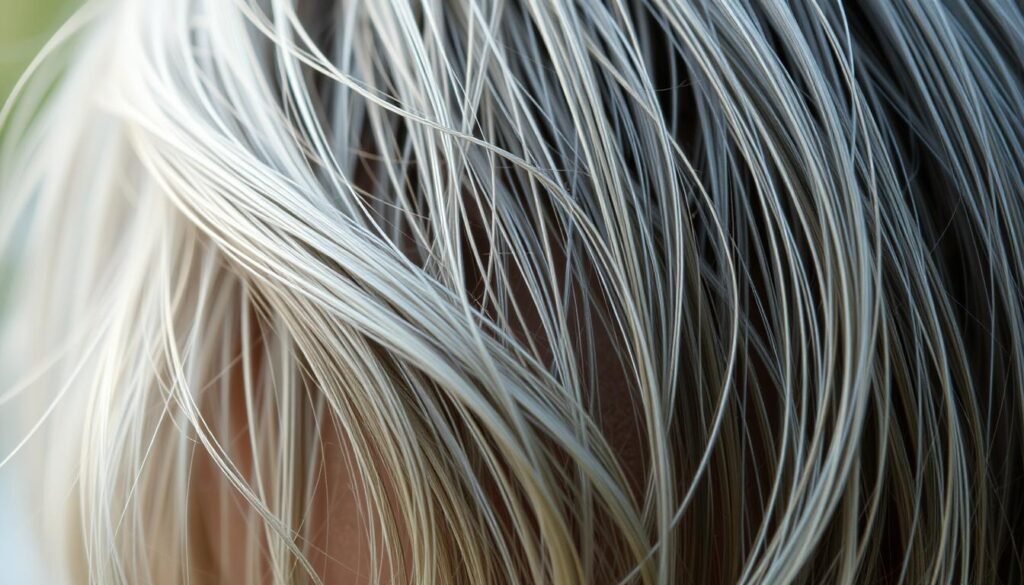
“Mainstream hair care discussions often overlook the senior demographic, leaving many seniors feeling underserved. It’s crucial to address their unique needs and provide them with the specialized care they deserve.”
Essential Hair Care Products
As we age, our hair needs become increasingly specific. Seniors require gentle, nourishing hair care products that can address the unique challenges of aging hair. When it comes to choosing the right shampoo and conditioner, seniors should prioritize formulations that are sulfate-free and designed to provide much-needed hydration.
Choosing the Right Shampoo
Seniors should opt for senior shampoo that is gentle and free of harsh sulfates, which can further dry out and damage fragile, aging hair. Look for shampoos containing ingredients like zinc pyrithione, which can be soothing and hydrating for the scalp. Avoid products with heavy fragrances or alcohols that can strip the natural oils from the hair and scalp.
Conditioning for Moisture and Health
Providing adequate moisture is crucial for keeping senior hair healthy and manageable. Rich, creamy gentle hair products like conditioners and leave-in treatments can help replenish lost hydration and prevent further dryness and frizz. Consider using a deep conditioning hair mask, such as one containing macadamia nut oil, once a week to intensely nourish the hair.
| Product | Benefit | Key Ingredients |
|---|---|---|
| Sulfate-free Shampoo | Gentle cleansing, scalp soothing | Zinc pyrithione, no sulfates |
| Creamy Conditioner | Intense hydration and softness | Macadamia nut oil, nourishing oils |
| Deep Conditioning Mask | Replenish moisture and strengthen | Macadamia nut oil, proteins |
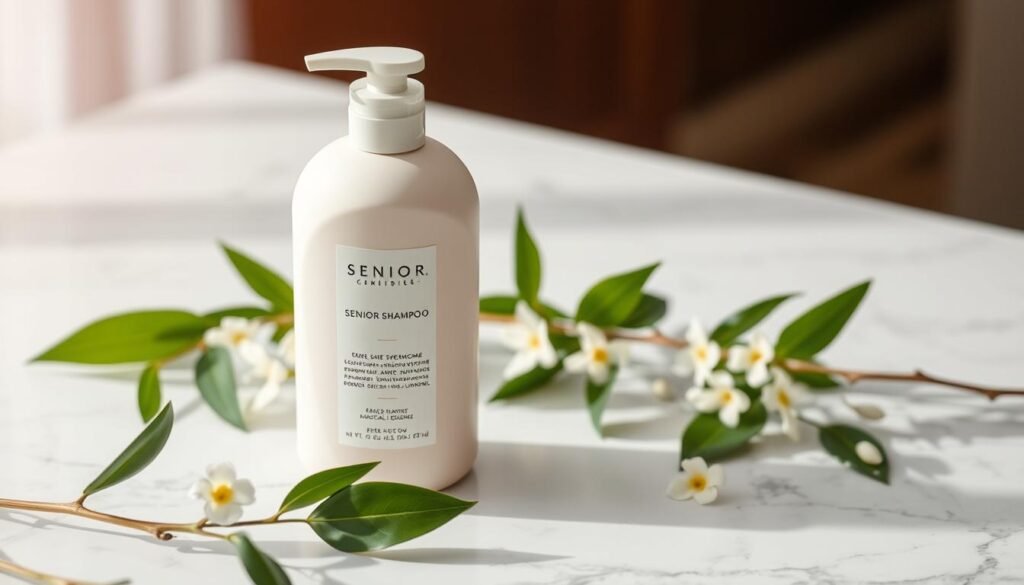
“Seniors should choose products that are sulfate-free and designed to provide ample hydration and nourishment for their aging hair.”
Scalp Care for Seniors
As we age, our scalp health becomes increasingly important for maintaining healthy, vibrant hair. Proper scalp care is essential for seniors who may experience changes in sebum production, pigment loss, and other age-related hair concerns.
Importance of Scalp Health
The scalp is the foundation for healthy hair growth. With age, hair follicles can shrink, and sebum production often declines, leading to dryness and itching. Maintaining a healthy scalp environment is crucial for preventing and addressing these Issues.
Best Practices for Scalp Care
- Gentle scalp massage: Regular, gentle massages can help improve blood flow and stimulate hair growth. Use soft-bristled brushes for gentle scalp stimulation.
- Lightweight scalp serums: Consider applying lightweight, nourishing scalp serums to rejuvenate the skin and support a healthy hair growth environment.
- Thorough yet gentle cleansing: Cleanse the scalp thoroughly but gently to remove buildup without stripping natural oils. Avoid hot water, which can contribute to dryness.
- Maintain scalp moisture: Use moisturizing, sulfate-free shampoos and conditioners to keep the scalp hydrated and prevent dryness and itching.
By incorporating these best practices into their hair care routine, seniors can help maintain a healthy scalp and promote optimal hair growth and vitality.
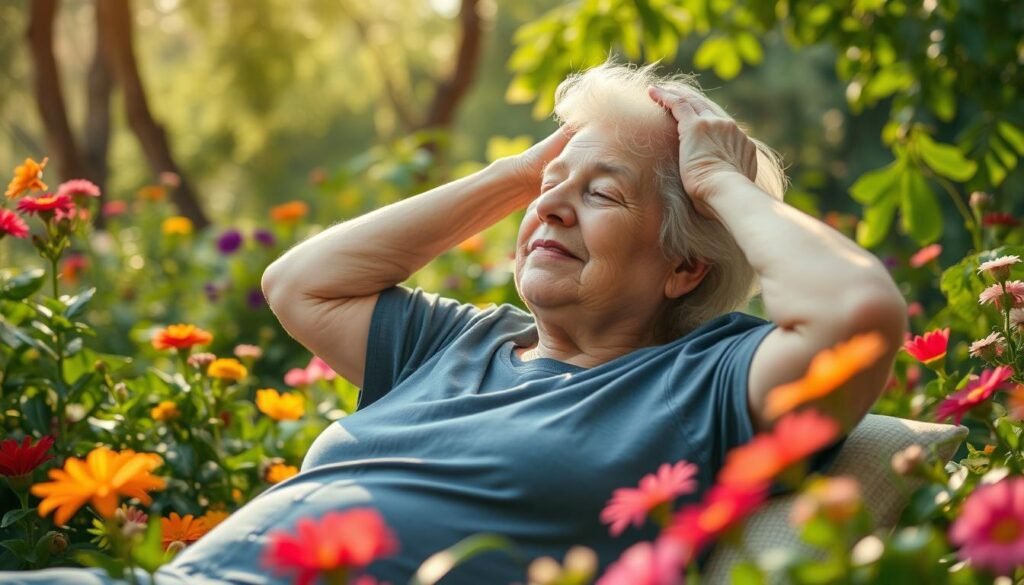
“Caring for the scalp is just as important as caring for the hair itself. A healthy scalp provides the perfect environment for hair to thrive.”
Tips for Washing Hair
As we age, our hair and scalp go through significant changes. Seniors often face challenges like thinning hair, dryness, and sensitivity, which require a gentler approach to hair care. When it comes to washing your hair, it’s important to strike the right balance to keep it healthy and vibrant.
Frequency of Washing
The frequency of washing hair can vary depending on individual needs. Generally, washing hair once or twice a week is sufficient for most seniors. However, seniors with oily scalps might need to wash their hair more often, perhaps two to three times a week. More active individuals who sweat regularly might also need to wash their hair more frequently.
On the other hand, washing hair less frequently may be beneficial for seniors with particularly dry or sensitive scalps, as it can help preserve natural oils and prevent excessive dryness. Regular haircuts every six to eight weeks can also help maintain the health of an elderly person’s hair.
Techniques for Gentle Washing
When washing your hair, it’s essential to use lukewarm water and gentle motions to avoid stripping away the natural oils. Avoid very hot showers, as the heat can be damaging to the hair and scalp. Consider co-washing or using dry shampoo between washes to maintain freshness without over-cleansing.
After washing, pat your hair dry with a soft towel instead of rubbing, which can lead to breakage. Use a wide-toothed comb to gently detangle your hair, taking care not to pull or tug. Conditioning treatments can also provide much-needed hydration and softness for thinning, aging hair.
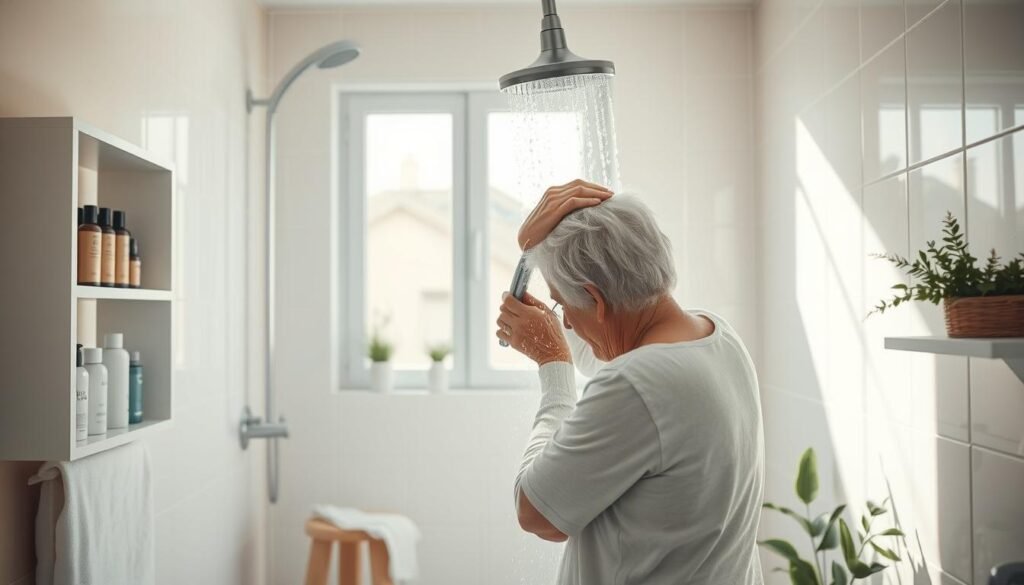
Remember, it’s crucial to pay attention to your individual hair and scalp needs, as seniors can experience a variety of hair-related concerns, from dandruff to eczema. Consulting with a doctor or a professional stylist can help you develop a customized hair care routine that addresses your specific needs and keeps your hair looking and feeling its best.
Styling Solutions for Thinning Hair
As we age, many seniors struggle with the frustrating problem of thinning hair. Fortunately, there are styling Solutions that can help create the appearance of fuller, more voluminous locks. The key is to use lightweight, volume-boosting products designed specifically for aging hair, and opt for hairstyles that add the illusion of thickness.
Volume-Boosting Products
Avoid heavy mousses and gels that can weigh hair down. Instead, look for thickening sprays infused with biotin, which can instantly add volume and lift at the roots. Volumizing shampoos and conditioners are also great for seniors with thinning hair, as they help plump up strands without leaving a greasy residue.
Recommended Hairstyles
- Layered cuts: Layers create the appearance of fuller, more voluminous hair by adding movement and dimension.
- Bangs: Strategically placed bangs can help camouflage thinning areas at the front of the scalp.
- Textured styles: Hairstyles with natural-looking waves or curls can make hair appear thicker and more vibrant.
- Pixie cuts: Short, versatile pixie cuts are a flattering option for seniors with thinning hair, as they draw attention to the face.
When styling, be gentle and avoid excessive heat, which can further damage delicate strands. Use low heat settings and always apply a heat protectant product to safeguard your hair.
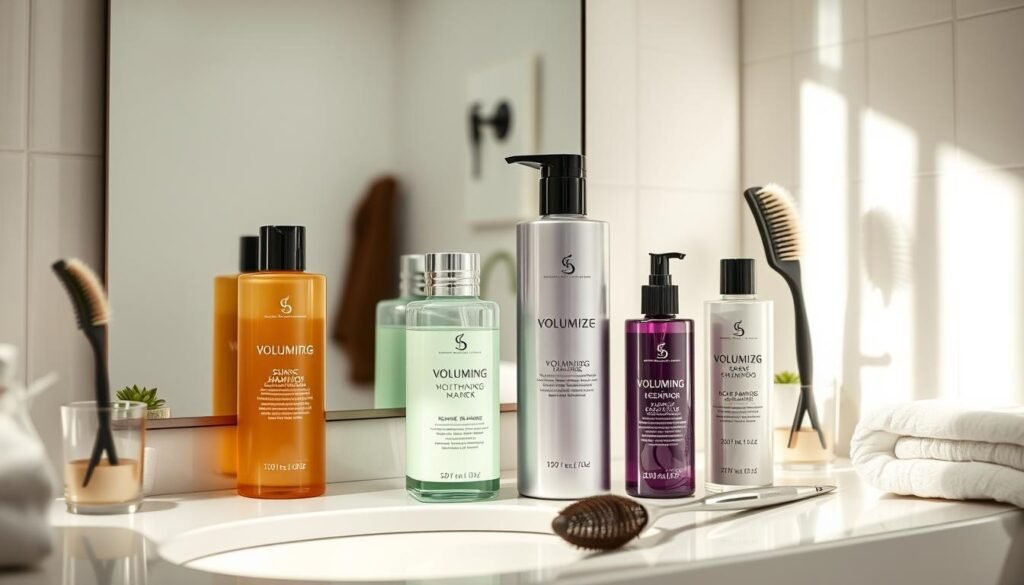
“Styling solutions for thinning hair are all about creating the illusion of volume and density. With the right products and hairstyles, you can regain the confidence and youthful appearance you desire.”
Nutrition for Healthy Hair
As we age, our hair undergoes significant changes, and maintaining its health becomes crucial. Proper nutrition plays a vital role in supporting strong, vibrant hair. By incorporating the right foods and supplements into your diet, you can help nourish your hair from within and promote its vitality.
Foods That Benefit Hair Health
A balanced diet rich in essential nutrients is the foundation for healthy hair. Some of the top food sources that can support hair health include:
- Fatty fish, such as salmon and mackerel, which are high in omega-3 fatty acids that can improve hair shine and strength.
- Nuts and seeds, like almonds and chia seeds, which provide a variety of vitamins and minerals, including vitamin E, zinc, and protein, all crucial for hair growth.
- Leafy greens, like spinach and kale, which are packed with vitamins A, C, and iron, helping to maintain a healthy scalp and promote hair follicle function.
- Sweet potatoes, which are rich in beta-carotene, a precursor to vitamin A, known to support sebum production and prevent dry, brittle hair.
- Bell peppers, which are an excellent source of vitamin C, supporting collagen production for stronger, more resilient hair.
Supplements for Stronger Hair
In addition to a nutrient-dense diet, seniors may benefit from targeted supplements to address any nutritional gaps. Some key supplements to consider for hair health include:
- Multivitamin: Ensuring you get a full spectrum of vitamins and minerals, such as biotin, iron, and zinc, can help strengthen hair and promote growth.
- Collagen: Collagen supplements may improve skin elasticity and hair thickness, addressing age-related changes.
- Protein powder: Increasing protein intake, especially for seniors, can support the production of keratin, the primary structural component of hair.
Remember to consult a healthcare professional before starting any new supplement regimen, as they can provide personalized recommendations based on your individual needs and health status.
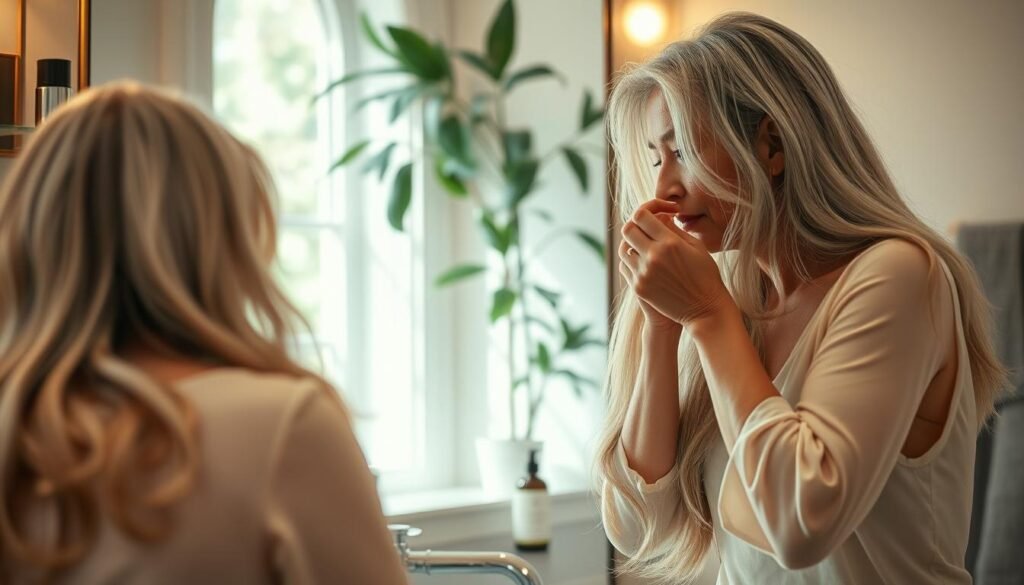
“Proper nutrition is essential for maintaining healthy, vibrant hair as we age. By incorporating the right foods and supplements, we can nourish our hair from the inside out.”
Handling Hair Breakage
As we age, our hair undergoes significant changes, becoming drier, coarser, and more prone to breakage. Understanding the causes of hair breakage and implementing effective prevention techniques can help seniors maintain healthy, vibrant locks. Let’s explore the strategies to tackle this common concern.
Identifying Causes of Breakage
Hair breakage can occur due to a variety of factors, including over-processing, heat damage, and rough handling. Reduced oil production in the scalp, a common effect of aging, can also contribute to dryness and increased fragility. Additionally, changes in hair structure and pigmentation can make the strands more vulnerable to breaking.
Prevention Techniques
- Opt for silk or satin pillowcases to minimize friction while sleeping, which can lead to hair breakage.
- Avoid tight hairstyles that put unnecessary stress on the hair, such as tight buns or ponytails.
- Incorporate deep conditioning treatments regularly to strengthen and nourish your hair, helping to prevent breakage.
- Be gentle when brushing or styling your hair, using a wide-tooth comb or a specialized detangling brush to minimize damage.
- Consider using leave-in treatments containing proteins or Argan Oil Taming Serum to fortify the hair strands and reduce breakage.
By addressing the root causes of hair breakage and implementing these prevention techniques, seniors can enjoy healthier, more resilient hair that looks and feels its best. Remember, a little extra care can go a long way in maintaining the beauty and vitality of your locks as you age.
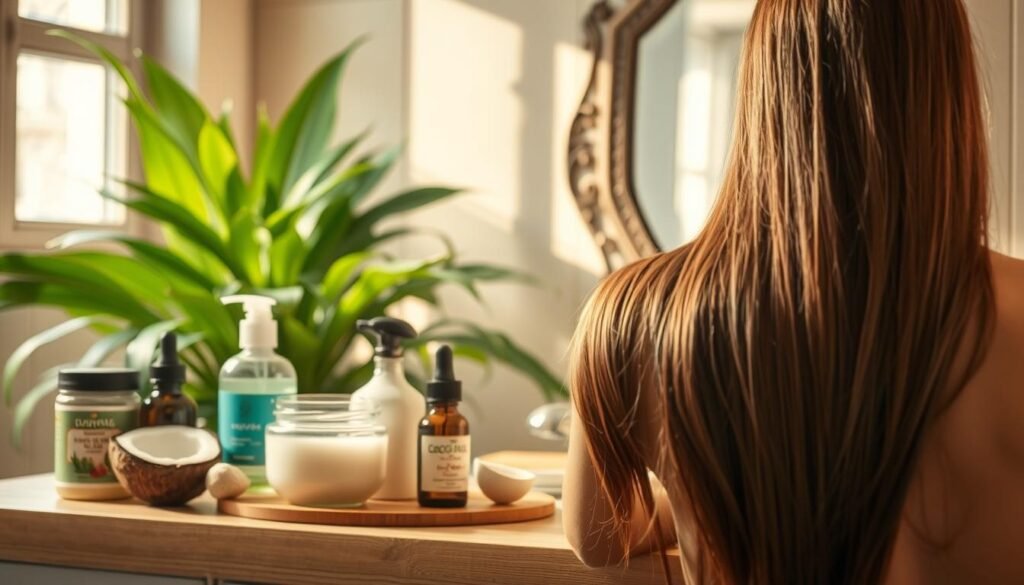
Regular Hair Maintenance
As we age, our hair goes through significant changes. Senior hair often becomes drier, more brittle, and prone to thinning. Maintaining a regular hair care routine is crucial to keep your locks healthy and vibrant. Two key aspects of this routine are getting regular trims and using DIY hair masks.
Importance of Regular Trims
Getting a trim every 6-8 weeks is essential for senior hair. Regular trims help prevent split ends from traveling up the hair shaft and causing further damage. This simple step can make a big difference in the overall health and appearance of your hair. It’s also a good idea to avoid over-styling and give your hair regular breaks from heat tools and tight hairstyles.
DIY Hair Masks for Seniors
- Avocado mask: Mash up a ripe avocado and apply it to your hair. Leave it on for 20 minutes before rinsing. Avocado is rich in vitamins and healthy fats that nourish aging hair.
- Honey mask: Mix honey with a bit of warm water and apply it to your hair. Honey is a natural humectant that helps lock in moisture.
- Olive oil mask: Warm up some olive oil and massage it into your scalp and hair. Cover with a shower cap and let it sit for 30 minutes before rinsing.
These homemade hair masks can provide an extra boost of hydration and nourishment for senior hair, helping to combat dryness and brittleness. Incorporating them into your routine once a week can make a noticeable difference.
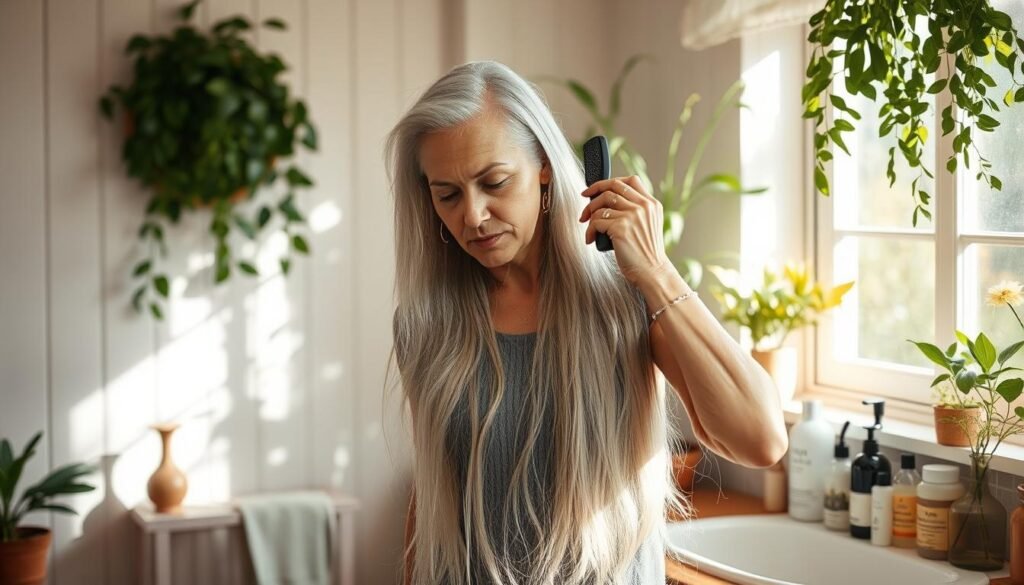
Regular hair maintenance is crucial for seniors to maintain healthy, vibrant hair. By getting regular trims and using nourishing DIY hair masks, you can combat the common challenges of aging hair and keep your locks looking their best.
Dealing with Hair Color Changes
As we age, our hair naturally transitions to a silvery or gray hue. While some seniors embrace their natural gray hair, others may choose to maintain their youthful color with hair coloring. The key is finding the right hair color that complements your aging skin tone and enhances your features.
Choosing the Right Hair Color
When selecting a hair color, consider shades that are one or two levels lighter or darker than your natural color. Avoid harsh, contrasting colors that can appear unnatural. Instead, opt for softer, more subtle hues that blend seamlessly with your graying strands. Highlights around the temple area can also create the illusion of volume and youthfulness.
Safe Coloring Techniques
- Use ammonia-free, gentle hair dyes to minimize damage to delicate, aging hair.
- Choose semi-permanent or permanent colors, as they can improve hair texture and add body.
- Opt for professional coloring services to ensure even application and minimize potential damage.
- Incorporate weekly deep-conditioning treatments to maintain hair health after coloring.
Remember, maintaining gray hair or finding the perfect hair color can be a delicate balance. By embracing the natural changes in your hair and using gentle, age-appropriate coloring techniques, you can achieve a vibrant, youthful appearance while preserving the health of your hair.
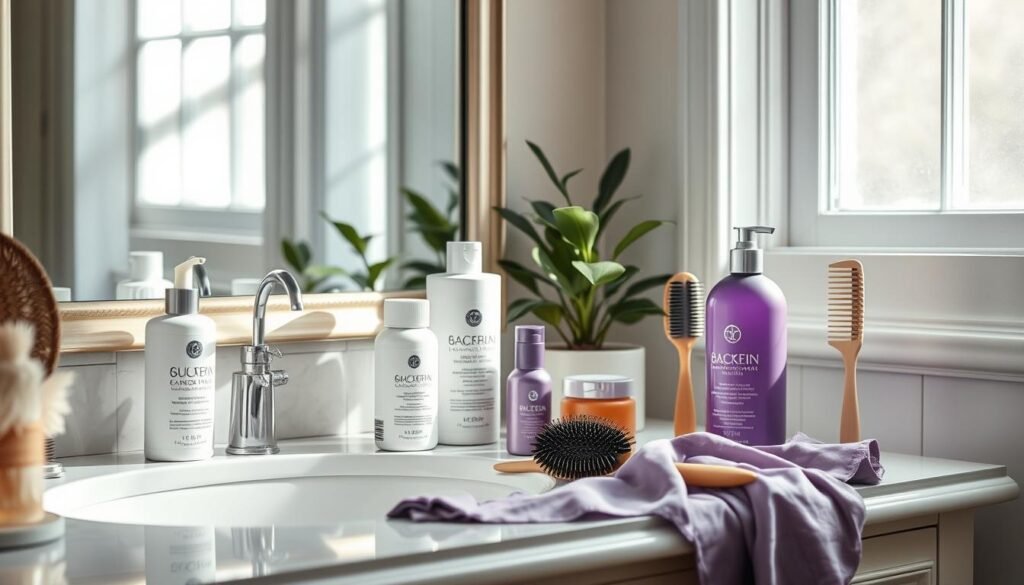
Professional Hair Care Services
As we age, our hair care needs evolve, and professional help can make a significant difference in maintaining healthy, vibrant hair. Finding the right stylist, someone experienced in working with mature hair, is crucial. These skilled professionals can assess your specific hair concerns and recommend personalized care routines and products to address them.
Finding the Right Stylist
When selecting a stylist, look for one who has experience catering to the unique needs of senior clients. They should have a deep understanding of how hair changes with age and be equipped to provide tailored solutions. Consider asking for recommendations from friends or checking online reviews to identify salons and stylists known for their expertise in senior hair care.
Recommended Treatments for Seniors
Professional salon treatments can be transformative for aging hair. Deep conditioning treatments, scalp treatments, and even keratin treatments can help restore moisture, strength, and shine to thinning or damaged hair. These specialized services, combined with the stylist’s guidance, can make a noticeable difference in the health and appearance of your hair. Regular salon visits can help maintain this optimal hair condition and keep you feeling confident in your style.
FAQ
What are the Common Hair changes that occur with age?
As people age, they often experience increased shedding, slower hair growth, more frizz and dryness, less volume, and loss of pigmentation. Hormonal changes during menopause can also impact sebum production, leading to increased dryness and brittleness. The scalp undergoes similar changes as facial skin, affecting overall hair quality.
What are the key concerns for seniors when it comes to hair care?
Common concerns for seniors include thinning hair, dryness, brittleness, and loss of shine. Hair texture becomes coarser and stiffer, and hair follicles become smaller with decreased sebum production. Hormonal changes can lead to increased shedding and slower regrowth.
What type of shampoo and conditioner should seniors use?
Seniors should use sulfate-free shampoos to prevent further dryness and frizz. Zinc pyrithione shampoos can be hydrating and soothing for the scalp. Rich conditioning treatments and leave-in products are essential for hydration. Macadamia nut oil masks can also be beneficial.
How can seniors maintain a healthy scalp?
Scalp health is crucial for overall hair health. Regular gentle massages can improve blood flow and stimulate hair growth. Using soft-bristled brushes for scalp stimulation and applying lightweight scalp serums can help rejuvenate the skin. Cleansing thoroughly but gently is important to remove buildup without stripping natural oils.
How often should seniors wash their hair?
Seniors should reduce washing frequency as sebum production decreases with age. Over-washing can strip natural oils and cause dryness. Use lukewarm water and gentle motions when washing, and consider co-washing or using dry shampoo between washes to maintain freshness.
What styling products and techniques work best for seniors with thinning hair?
Use lightweight volumizing products designed for aging hair, such as thickening sprays with biotin for instant volume. Opt for hairstyles that create the illusion of fullness, such as layered cuts. Avoid excessive heat styling, which can damage delicate strands, and use low heat settings with heat protectant products.
What nutrients are important for healthy hair in seniors?
A balanced diet rich in protein, iron, zinc, vitamin C, B vitamins, and omega-3 fatty acids supports hair health. Consider taking a daily multivitamin and collagen supplements to address nutritional gaps. Foods like fatty fish, nuts, seeds, and leafy greens are beneficial for hair.
How can seniors prevent hair breakage?
Identify causes of breakage such as over-processing, heat damage, or rough handling. Use silk or satin pillowcases to reduce friction while sleeping, avoid tight hairstyles, and apply deep conditioning treatments regularly to improve hair strength. Be gentle when brushing or styling to prevent unnecessary breakage.
How often should seniors get their hair trimmed?
Regular trims every 6-8 weeks help maintain hair health and prevent split ends. DIY hair masks using natural ingredients like avocado, honey, or olive oil can provide extra moisture. Gentle brushing with a soft-bristled brush can distribute natural oils and promote scalp health.
How can seniors maintain their gray hair?
Embrace natural gray or choose hair colors that complement aging skin tones. Semi-permanent or permanent colors can improve hair texture and add body. Consider adding highlights around the temple area to create the illusion of volume. Use ammonia-free, gentle hair dyes to minimize damage.
What professional hair care services are recommended for seniors?
Choose a stylist experienced in working with mature hair. Consider salon treatments like deep conditioning, scalp treatments, or keratin treatments for added hair health. Professional stylists can recommend personalized care routines and products. Regular salon visits can help maintain hair health and style, and some salons offer specialized services for seniors, including mobile services for those with limited mobility.
